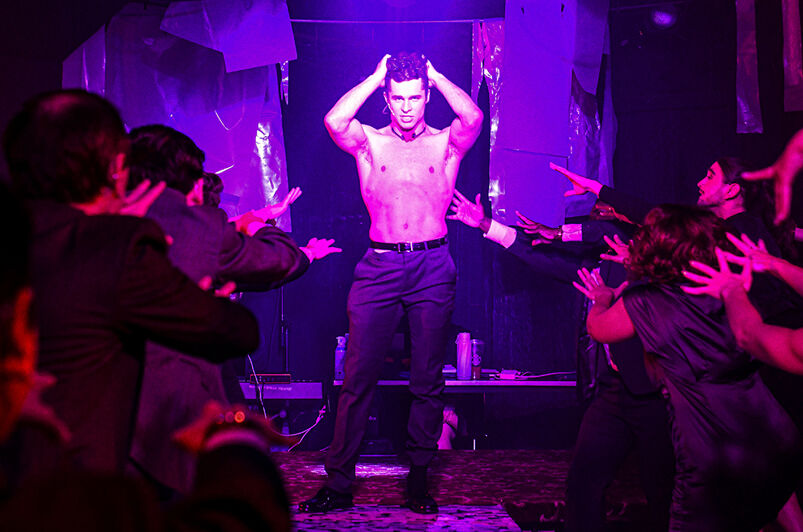
The Rundown
American Psycho has been a cultural phenomenon for over three decades. And now Patrick Bateman is singing for his supper.
The controversial 1991 hit novel by queer wunderkind Bret Easton Ellis — a dark critique of late-stage capitalism riddled with misogynistic sex and violence — was optioned for film soon after publication. After years in development, the iconic 2000 movie, directed by Mary Harron and co-adapted by queer screenwriter and actress Guinevere Turner — elevated former child actor Christian Bale into superstardom.
Featuring a book by Roberto Aguirre-Sacasa and score by’ 90s pop star Duncan Sheik, American Psycho: The Musical ran in London in 2013 (starring Matt Smith and Ben Aldridge) and on Broadway in 2016 (featuring The Other Two’s Helene Yorke). The production finally makes its Chicago premiere with an up-close-and-personal production by storefront theater Kokandy Productions.
No Tea, No Shade
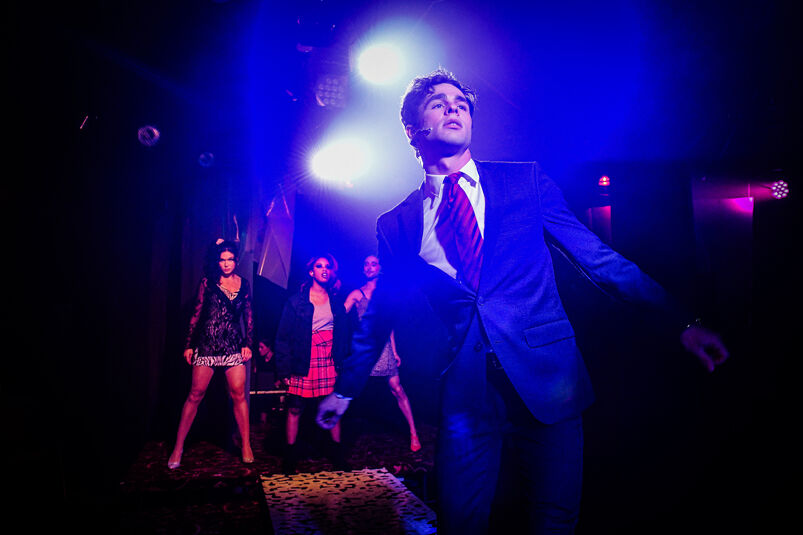
It’s the late 1980s, and Patrick Bateman (Kyle Patrick) is loving every minute, at least on the outside. The Wall Street investment banker seemingly has it all — a killer body, Armani ties aplenty, and a gorgeous apartment in the same building as a certain Top Gun star — but craves a satisfaction that not even his fashionable girlfriend Evelyn (Caleigh Pan-Kita) or hot side piece Courtney (Danielle Smith) can provide.
Meanwhile, Patrick’s nemesis, Paul Owen (John Drea), is more connected, and his business cards are a thing of beauty. On his 27th birthday, Patrick stabs a homeless man to death and feels… something. But as the bodies pile up, Patrick wonders if that’s all there is and if his rampages are even real.
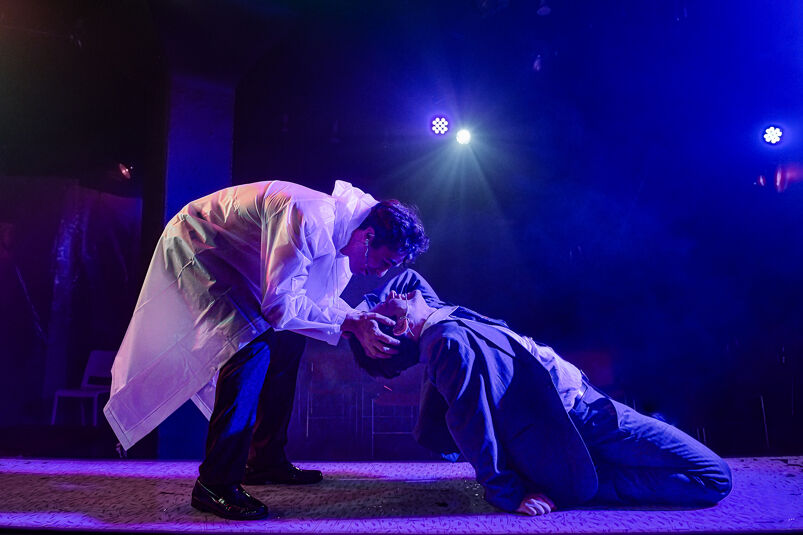
As a book and film, American Psycho is a modern classic: a gory and darkly funny takedown of ’80s excess through the eyes of one of literature’s most unreliable narrators. In the musical, Aguirre-Sacasa’s book smartly references the source material, with plenty of witty yet biting asides from Patrick inspired by Ellis’s still-genius writing. Everything is perceived from Patrick’s gaze, and therefore, nothing is certain — until one of Sheik’s songs pops up, shifting the point of view to long-suffering secretary Jean (Sonia Goldberg) or label-obsessed Evelyn. The show’s best songs are from the period, including “Hip to Be Square” by Patrick’s favorite band, Huey Lewis and the News, played in its entirety during a disturbing Act I finale.
That’s not to say the score’s inconsistencies hinder Kokandy’s production. Director Derek Van Barham — one of Chicago storefront’s finest—delivers a bloody solid product (though a bit more stage blood would have been most welcome). Staging the musical in the round on an ‘80s-tastic runway decoupaged with Patrick’s beloved business cards invites the audience to experience American Psycho’s gorgeous yet volatile world firsthand. Breon Arzell’s choreography supplies an erotic taste of the era’s drug-fueled club kid underground.
Let’s Have a Moment
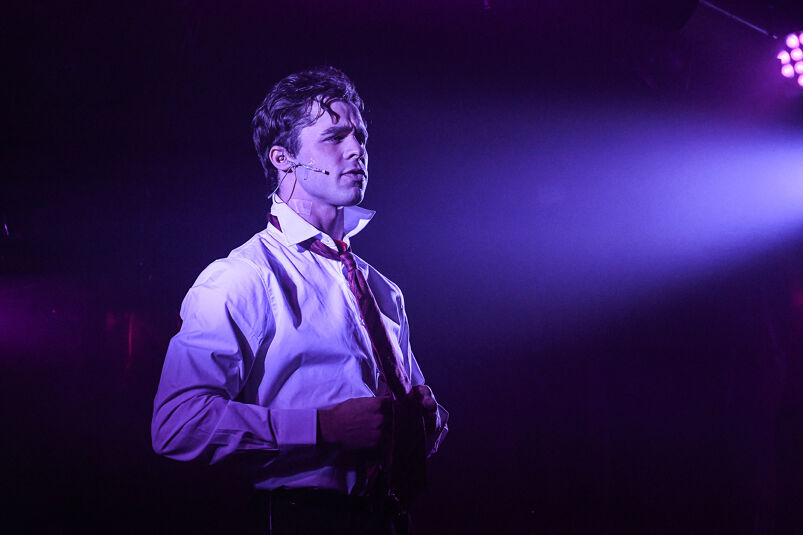
American Psycho can’t function without a magnetic Patrick Bateman — an extremely challenging role that seldom leaves the stage for the show’s two-and-a-half-hour run-time. Kyle Patrick draws upon his experience as an aerialist and an actor, and his physicality is top-notch. Bateman is hyperaware of how he presents himself to the outside world and possesses extreme vanity. Patrick’s serpentine strut, perpetual smirk, and balletic executions radiate star quality and pitch-perfect casting. Rather than emulate Christian Bale’s unique vocal delivery, the actor creates a fabulously skeevy interpretation, leaving the audience equal parts aroused and shaken.
The Last Word
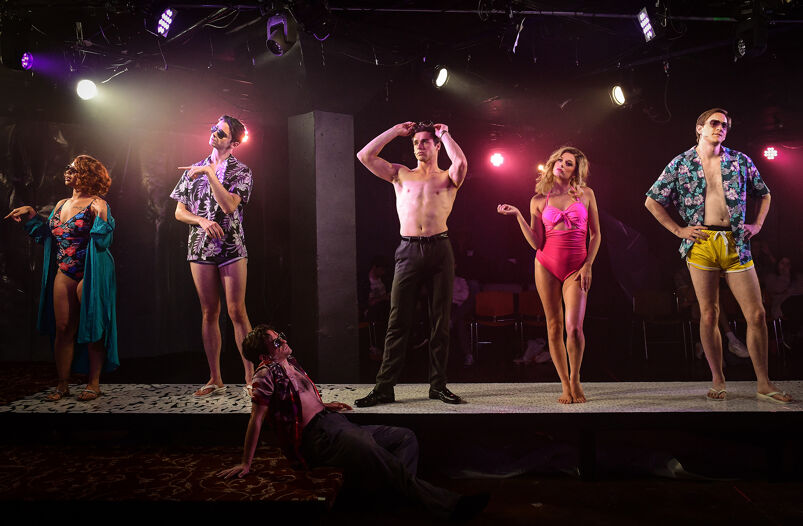
As a musical, American Psycho meanders with a run-time that occasionally drags and a score that fails to find its groove (at least until Huey Lewis comes on). When asked about adaptations of his works, author Bret Easton Ellis said, “With novels, you’re on your own, and you don’t have to engage with those things — it’s all about language and style. I can never picture what my narrators look like. It’s not what I’m focusing on.”
But Kokandy Productions knows exactly how to draw your attention with its intimate production, thanks to creative staging, dynamic choreography, and an electric cast led by a killer Patrick Bateman.
American Psycho: The Musical plays at Chicago’s Chopin Theater through November 26.
Related:
‘Beautiful Thing’ remains as relevant as ever in this latest reimagining
Jonathan Harvey’s play “Beautiful Thing” receives a powerful revival with a fresh and complex take on gay love.
This article includes links that may result in a small affiliate share for purchased products, which helps support independent LGBTQ+ media.








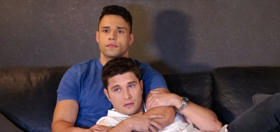







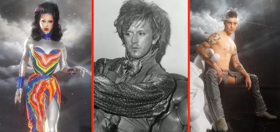
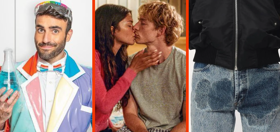


Kangol2
Not sure if Queerty’s Matthew Wexler has ever or never read the original novel American Psycho, but it is extremely disturbing and saturated with narcissistic, often racist and misogynistic violence, which was key to the message Bret Easton Ellis was striving to convey about the period, the conservative, consumerist, neoliberal 1980s, that he was writing about.
The novel’s utterly empty, soulless, delusional, truly psychotic main character, Patrick Bateman was the antithesis of a functioning human being–he was obsessed with labels, status and surfaces, outré acts of murder (violently killing Black homeless people, cutting out women’s genitalia, etc.), obsessing over spotting and getting close to Don the Con, etc., In other words, he is the very opposite of someone that sane people would want to see on a stage, let alone in a musical.
JScott
Per Kangol2, the musical makes the same points about Patrick being “The novel’s utterly empty, soulless, delusional, truly psychotic main character, Patrick Bateman was the antithesis of a functioning human being–he was obsessed with labels, status and surfaces…”
The musical does NOT refer to killing black homeless people or genital mutilation; but the killings are many, and the themes of narcissism, misogyny, and consumerism still play true.
Although I thought Benjamin Walker was excellent, the New York production wasn’t a perfect musical, but it conveyed the themes you are discussing. I liked it. It was very overshadowed by the opening of Hamilton at the same time.
As for being a bad fit for a musical – yes, but… There are plenty of very dark musicals and musical topics that are entertaining but still denounce the evil. Sweeney Todd and Next To Normal pop into mind. And Next To Normal was stunning.
I am not disagreeing with your points here, I am just saying that a topic like this does not mean a musical cannot work and cannot still bring negative characters forward without approval at all. And it would be much more disturbing (and less profitable) as a straight play.
Man About Town
I wonder what makes Mr. Wexler assume Mr. Ellis and Ms. Turner identify as “queer.”